Related Research Articles

BlackBerry is a brand of smartphones, tablets, and services originally designed and marketed by Canadian company BlackBerry Limited. Beginning in 2016, BlackBerry Limited licensed third-party companies to design, manufacture, and market smartphones under the BlackBerry brand. The original licensors were BB Merah Putih for the Indonesian market, Optiemus Infracom for the South Asian market, and BlackBerry Mobile for all other markets. In summer 2020, the Texas-based startup OnwardMobility signed a new licensing agreement with BlackBerry Limited to develop a new 5G BlackBerry Smartphone. The device, which will probably be released in 2021, is expected to have flagship specifications and a BlackBerry-typical physical keyboard. For the creation of the new BlackBerry-branded smartphones, OnwardMobility is cooperating with BlackBerry Limited and FIH Mobile.

Microsoft Outlook is a personal information manager software system from Microsoft, available as a part of the Microsoft Office suite. Though primarily an email client, Outlook also includes such functions as calendaring, task managing, contact managing, note-taking, journal logging, and web browsing.
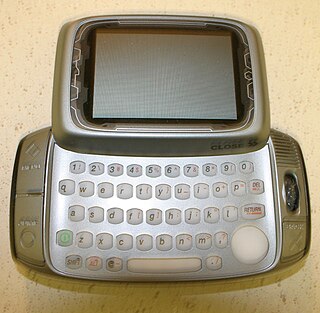
The Danger Hiptop, also re-branded as the T-Mobile Sidekick, Mobiflip and Sharp Jump is a GPRS/EDGE/UMTS smartphone that was produced by Danger, Inc. from 2002 to 2010.
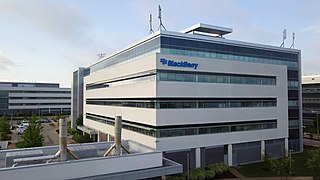
BlackBerry Limited is a Canadian cybersecurity company specializing in enterprise critical event management solutions, endpoint protection, and securing the Internet of things by using artificial intelligence and machine learning against cyberthreats. Originally known as Research In Motion (RIM), it developed the BlackBerry brand of interactive pagers, smartphones, and tablets. It transitioned to a cybersecurity enterprise software and services company under Chief Executive Officer John S. Chen. Its products are used by various businesses, car manufacturers, and government agencies to prevent hacking and ransomware attacks. They include BlackBerry Cylance's artificial intelligence based cyber-security solutions, the BlackBerry AtHoc emergency communication system (ECS) platform; the QNX real-time operating system; and BlackBerry Enterprise Server, a Unified Endpoint Management (UEM) platform.
Telus Mobility is a Canadian wireless network operator and a division of Telus Communications which sells wireless services in Canada on its numerous networks. It operates networks using LTE and HSPA+ on its mainstream networks. Telus Mobility is the second-largest wireless carrier in Canada, with 10.6 million subscribers as of Q3 2020.
Push email is an email system that provides an always-on capability, in which new email is actively transferred (pushed) as it arrives by the mail delivery agent (MDA) to the mail user agent (MUA), also called the email client. Email clients include smartphones and, less strictly, IMAP personal computer mail applications.
Mobile marketing is a multi-channel online marketing technique focused at reaching a specific audience on their smartphones, feature phones, tablets, or any other related devices through websites, E-mail, SMS and MMS, social media, or mobile applications. Mobile marketing can provide customers with time and location sensitive, personalized information that promotes goods, services, appointment reminders and ideas. In a more theoretical manner, academic Andreas Kaplan defines mobile marketing as "any marketing activity conducted through a ubiquitous network to which consumers are constantly connected using a personal mobile device".
The public history of Gmail dates back to 2004. Gmail, a free, advertising-supported webmail service with support for Email clients, is a product from Google. Over its history, the Gmail interface has become integrated with many other products and services from the company, with basic integration as part of Google Account and specific integration points with services such as Google+, Google Calendar, Google Drive, Google Hangouts, Google Meet, YouTube, and Google Buzz. It has also been made available as part of G Suite. The Official Gmail Blog tracks the public history of Gmail from July 2007.
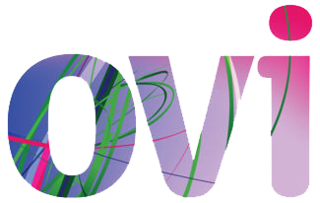
Ovi by Nokia was the brand for Nokia's Internet services. The Ovi services could be used from a mobile device, computer or via the web. Nokia focused on five key service areas: Games, Maps, Media, Messaging and Music. Nokia's aim with Ovi was to include third party developers, such as operators and third-party services like Yahoo's Flickr photo site. With the announcement of Ovi Maps Player API, Nokia started to evolve their services into a platform, enabling third parties to make use of Nokia's Ovi services.

Tagged is a social discovery website based in San Francisco, California, founded in 2004. It allows members to browse the profiles of any other members, and share tags and virtual gifts. Tagged claims it has 300 million members as of 2014. As of September 2011, Quantcast estimates Tagged monthly unique users at 5.9 million in the United States, and 18.6 million globally. Michael Arrington wrote in April 2011 that Tagged is most notable for the ability to grow profitably during the era of Facebook.
Blue Whale Systems Ltd is a privately held company located in Chiswick, London, England. The company provides push email software for mobile phones and devices using open standards as well as push mobile social networking software.

Nextel Communications, Inc. was an American wireless service operator that merged with and continues to exist as a wholly owned subsidiary of Sprint Corporation, which would later be bought by T-Mobile. Nextel in Brazil, and formerly in Argentina, Chile, Peru, the Philippines, and Mexico, is part of NII Holdings, a stand-alone, publicly traded company not owned by Sprint Corporation.
MobileMe is a discontinued subscription-based collection of online services and software offered by Apple Inc. All services were gradually transitioned to and eventually replaced by the free iCloud, and MobileMe ceased on June 30, 2012, with transfers to iCloud being available until July 31, 2012, or data being available for download until that date, when the site finally closed completely. On that date all data was deleted, and email addresses of accounts not transferred to iCloud were marked as unused.
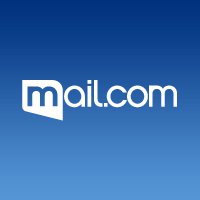
Mail.com is a web portal and web-based email service provider owned by the internet company 1&1 Mail & Media Inc., headquartered in Chesterbrook, Pennsylvania, USA. 1&1 Mail & Media Inc. is a subsidiary of United Internet Group, a publicly listed company based in Germany which is considered a pioneer of online communication.
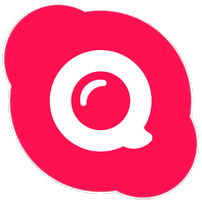
Skype Qik was a video messaging service by Skype. It was created by the company, Skype Technologies, who acquired Qik. The service, offered for Android, iOS, and Windows Phone devices, allowed users to exchange video messages between individuals or within a group.

Data and Audio-Visual Enterprises Wireless, d/b/a Mobilicity, was a Canadian mobile virtual network operator (MVNO) owned by Rogers Communications. Its name was a portmanteau of the words "mobility" and "simplicity". Mobilicity was one of several new mobile network operators, along with Public Mobile and Wind Mobile, which launched in Canada after a government initiative to encourage competition in the wireless sector. The carrier had over 250,000 Mobilicity subscriptions on May 16, 2013, the day in which Telus announced its failed attempt to acquire Mobilicity. The subscription count decreased to 157,000 by April 2015 according to court documents filed by Mobilicity's Chief Restructuring Officer in that month.
Clearnet was a division of Telus Mobility launched in April 2011 to sell landline and mobile phone bundles in Western Canada. It was a revival of the Clearnet Communications brand name, which originally belonged to an independent cellular provider that was merged into Telus Mobility in 2000. Telus relaunched Clearnet as a discount provider with a "limited market trial" in Kelowna, British Columbia and Red Deer, Alberta.

iCloud is a cloud storage and cloud computing service from Apple Inc. launched on October 12, 2011. As of 2018, the service had an estimated 850 million users, up from 782 million users in 2016.

Mailbox was a freeware email management application for iOS and Android, developed by Orchestra, Inc. It drew the attention of numerous technology blogs for its usability and innovative features, such as swipe-based email sorting, snoozing and filtering. Weeks before its launch, a pre-registration period resulted in a waiting list of over 380,000 reservations. Upon its iOS launch on 7 February 2013, Mailbox became the second-most-downloaded free app in the App Store that day.
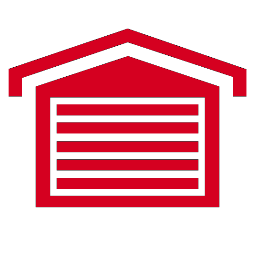
The Microsoft Garage is a Microsoft program that encourages employees to work on projects about which they are passionate, despite having no relation to their primary function within the company. Employees from all divisions of Microsoft are free to take part in Microsoft Garage activities and small-scale innovation projects. The Microsoft Garage is a global program with locations on the main campus in Redmond, Washington, and several others spread all over the world, and a website that launched in October 2014 to share experimental projects with customers.
References
- ACOA announces plans to sue Consilient
- Mobile Mag
- Business week
- CBC.ca - N.L. technology darling Consilient closes its doors